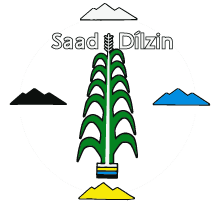Mode
The mode of a Navajo verb conveys information about the timing of an action or condition. There are seven modes: Imperfective, Perfective, Future, Iterative, Usitative, Optative, and Progressive. This website provides descriptions of each mode and provides example sentences that illustrate the modes. Certain adverbial expressions are compatible with only some of the modes. Examples of these are included also.
Here is one example with a verb in the optative mode:
Each sentence is displayed with the Navajo text on the first line, an English translation on the third, and a gloss of words and word parts on the second. The verb stem is in italics and indicates the mode. There is also a red button which, when clicked, will allow you to hear a recording of a speaker saying the sentence. For more information on the gloss of words and word parts visit this link. For this project we draw on previous work by Fernald & Perkins (manuscript), Young & Morgan (1987), Young, Morgan & Midgette (1992), and others cited in References [link].
In the box below you can search for sentences by verb, mode, or adverb.
An example search has returned 50 entries
’Anishkeed, t’áá ká nóólk’oł lágo.
2-3-photograph.I neg 2-blink.O LÁGO’Ashdladi oolkiłgo ’áko shį́į́ ’índa ákǫ́ǫ́ diikah.
five.at time-GO only until then there 1dpl-go.pl.I’Ashkii bi’éé’ hazhó’ó ’ayíyiischid dóó ’ólta’ góne’ yah ’ííyá.
boy 3-shirt nicely 3-3-tuck.in.P and 3-go.P’Ałk’idą́ą́’ shimá bił na’nishkaadgo ’aghaa’ yisdizígíí dibé yázhí yichíihgo yizénéíłt’ih.
long ago 1-mother 3-with SUP-1-herd.I-GO wool 3-spin.P-ígíí lamb 3-birth.P-GO 3-neck-around-3-tie.PLong ago, while herding sheep with my mother, she used to tie a yarn around the newborn lamb’s neck.
bookmark- ’ałk’idą́ą́’ long ago, formerlyfind in Navajo Adverb Lexicon
- -dą́ą́’ past timefind in Navajo Postposition Lexicon
- -ił withfind in Navajo Postposition Lexicon
- Imperfective (I) (∅, ni, si, yi-∅)
- na’nishkaad herd, go out herding
- -go verb and subordinating encliticfind in Navajo Adverb Lexicon
- -go verb and subordinating encliticfind in Navajo Adverb Lexicon
’Ólta’góó daats’í deeshááł doodaii’ jooł bee nideeshneeł.
school-toward maybe 1-walk.F or ball 3-with 1-play.F'Ólta’góó dayínóhkááh.
school-toward pl-2dpl-go.pl.IBéégashii báháchxį’go bik’ee neeshchééł.
cattle 3-become.angry.I-GO 3-on.account.of 1-flee.ProgBilagáana bizaad bił nantł’a.
English language 3-with 3-difficult.NIChidí bitoo’ hadi’dííłbį́į́łgo ’índa Na’azhǫǫshgóó diikah.
car 3-fuel 3.fill.up-GO.P only.then casino-GOO 3pl.go.FChidí naa’na’í ’ayóo bídin nishłį́.
tractor really 3-without 1-be.NIChidí nidabinóołtłáád.
car pl-3-2dpl-stop.OChidí sits’ą́ą́’ hashtł’ish yiih yilwodgo t’áá ch’į́į́góó ch’ééh ’ííł’įįd.
car 1-away mud 3-into 3-go.P-GO just fail in.vain 3-1-act.PI did everything possible to get my car out of the mud.
bookmark- -ts’ą́ą́’ away from, separating from, derived fromfind in Navajo Postposition Lexicon
- location
- -iih intofind in Navajo Postposition Lexicon
- location
- -go verb and subordinating encliticfind in Navajo Adverb Lexicon
- ch’į́į́góó, ch’ínígóó everything possible without resultfind in Navajo Adverb Lexicon
- ch’ééh in vain, futilely, tryfind in Navajo Adverb Lexicon
Diné bikéyah bikáa’gi ndahonidzood yę́ędą́ą́’ Naatsis’áán hoolyéégóó niha’áłchíní bił ’adahineet’į́į́’.
Navajo 3-land 3-on-at pl-areal-3-flee.pl.P past Navajo.Mountain areal-be.called.NI-to 1pl-children 3-with pl-1dpl-sneak.off.PAt the time people were on the run in Navajoland, fleeing in small groups, we sneaked away with our children one group after another, to Navajo Mountain.
bookmark- -káá’ on, on top offind in Navajo Postposition Lexicon
- location
- -gi atfind in Navajo Postposition Lexicon
- location
- Perfective (P) (yi, ni, si, yi-∅)
- yę́ędą́ą́’ pastfind in Navajo Conjunction Lexicon
- Neuter Imperfective (NI)
- -ił withfind in Navajo Postposition Lexicon
- accompaniment
- Perfective (P) (yi, ni, si, yi-∅)
Díigi ’át’éegoósh ’ájiił’įįh?
this-at 3-be-GO-Q SUP-4-do.PDíí ’abíní dibé tóógóó neeshkał.
this morning sheep water-to 3-1-herd.ProgDíísh haa yit’éego ’atiin?
this-Q how 3-be.NI roadDoo ’áłah diidleeł da.
NEG together pl-1dpl-meet.pl.F NEGDoo hanii kintahgóó díníyáa da nisin.
NEG contrary town-toward 2-start.go.P NEG 1-think.CIDoo t’áá k’ad chidí na’ní’ą́ą da.
NEG just now vehicle 2-3-1-lend.P NEGDziłdę́ę́’ hoołtį́į́ł ńt’éé’ t’áá nihich’į’jį’ ’ásdįįd.
mountain-from areal-rain.Prg past just 1pl-toward-up.to 3-disappear.PHa’át’éegoshą’ t’áadoo ’azee’ál’į́į́góó nisíníyáa da?
why-Q NEG hospital-to 2-go.sg.P NEGHaash nízah kodóó nighanjį’?
how-Q 3-long.N here-from 2-home-toHatáálgóó déyáago shikélchí t’óó tsxį́į́łgo bił ’ada’shéshiizhgo ńdaséłkad.
ceremony-1-go-Fut-GO 1-moccasin merelyhurry.GO 3-with 3-1-pierce-GO 3-1-sew-PHá’át’íí lá hastiin dóó ’at’ééd ’áyiilaa?
what Q man and girl 3-3-make.PHái da shą’ tsinaa’eeł ’ájiilaa lá?
who DA Q boat 3-4-make.P DISCjíí’aal
3DO-4-chew.it.PK’ad nitsii’ yiilch’ííł ’ákó doo niba’ da doo.
now 2-hair 3-2-curl.I so.then.NI NEG 2-wait NEG will.be.FNáńsdzáago t’áá ’íídą́ą́’ ’ííníyą́ą’ dooleeł.
back-1-go.sg.P-GO just already INDEF-2-eat.P FUTNichidí háadish nííníłbą́ą́z?
2-car where-at-Q 3-2-park.PNíwe, doo tsésǫ’ góne’ ch’ééjí’nah da!
stop NEG window 3-into 4-crawl.R NEGSha’áłchíní béeso ’ashladiin baa nínil ńt’éé’ t’ááła’ajį́ ’ałtso yibadooskai.
1-children money 50 3-for 2-put.PlO.P past at-once all 3-3-exhaust.PShighanídóó ’e’e’aah bich’ijígo shádí bighan.
1-home-from west 3-in.the.direction.of older.sister 3-dwell.NShik’is bił ’ílyeed ’áko shį́į́ da’diidį́į́ł.
1-friend 3-with 3-drive CONJ 1-Pl-eat.FShizhé’é nihwiiłdlaadgo bikéé’ naad’ ’adaashjaah łeh.
1-father 3-3-plow.I-GO 3-behind corn 3Pl-1-drop.I Cust.T’áadoo hosh biih dadoołtaałí.
neg cactus 3-in pl-2dpl-step.O-ÍT’áá ní’áłtsé hooghandi nánísdzá.
thus you first home-at 1-arrived.Rev. PTó lą’ígo nidlą́ ’áko bee nitah yá’áh’hoot’ééh dooleeł.
water many 3-2-drink.DI so 3-with 2-among pl-3-good.NI futureDrink lots of water so that you can be healthy.
bookmark- Imperfective (I) (∅, ni, si, yi-∅)
- ’áko so, so that, so thenfind in Navajo Conjunction Lexicon
- -ee by means offind in Navajo Postposition Lexicon
- -tah, -taa-, -ta- among, mixingfind in Navajo Postposition Lexicon
- Neuter Imperfective (NI)
- dooleeł futurefind in Navajo Adverb Lexicon
- dooleeł futurefind in Navajo Adverb Lexicon




